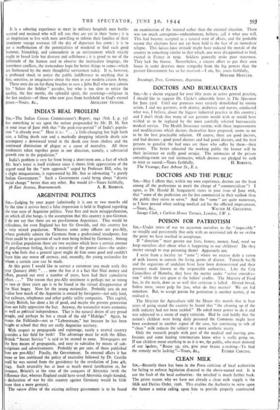ARGENTINE POLITICS
Sta,—Judging by your paper (admittedly it is one or two months old by the time it arrives here) a false impression is held in England regarding the true state of Argentine politics. Your first and main misapprehension, on which all else hangs, is the assumption that this country is pro-German. I do not say that there are no pro-German Argentines. That would be ridiculous, for even England has her Sir Oswalds, and this country has a very mixed population. Whereas some army officers are pro-Ally, others probably admire the Germans from a professional standpoint, but there could be no question of such men being bribed by Germany. Among the civilian population there are two sections which have a certain amount of pro-German feeling, firstly a minority of the poorer class—the under- dog who feels that a general upset might do him some good and couldn't leave him any worse off anyway, and, secondly, the young nationalist for whom a certain case. can be made.
At this point I would like to correct a statement you made early this year (January 28th) " . . none the less it is a fact that Nazi money and effort, poured out over a number of years, have had their cumulative effect. . . ." The reason that pro-Ally sentiment is perhaps not so strong as two or three years ago is to be found in the virtual disappearance of the Nazi bogey. Now for the young nationalist. Probably you do not realise how much of the Argentine is owned by foreigners—not only land, but railways, telephones and other public utility companies. This capital, mainly British, has done a kit of good, and maybe the present generation does not fully appreciate the fact. Anyway, the nationalist wants economic as well as political independence. That is the natural desire of any proud people, and perhaps he has a streak of the old "Hidalgo." Again, he wants the Falklands—not as "Lebensraum," but because he has been taught at school that they are really Argentine territory.
With respect to propaganda and espionage, surely a neutral country provides a fair field for both! The advantage must lie with the Allies. British " Secret Service " is said to be second to none. Newspapers are the best means of propaganda, and easy to subsidise by means of sub- scriptions and advertisements. Probably 90 per cent, of those published here are pro-Ally! Finally, the Government. In external affairs it has more or less continued the policy of neutrality followed by Dr. Castillo until he was ousted from the presidency by the revolution of June 4th, 1943. Such neutrality has at least as much moral justification as, for instance, Britain's at the time of the conquest of Abyssinia (with the difference that, whereas England could have saved Abyssinia single-handed, a declaration of war by this country against Germany would be little more than a mere gesture).
The raison d'etre of the existing military government is to be found on examination of the internal rather than the external situation. There was too much corruption—embezzlement, bribery, call it what you will. This had become accepted as a natural state of affairs, and the probable reason that elections have not yet been held is the fear of an immediate relapse. This laissez-faire attitude' might have reduced the morale of the country to something similar to that which, you were disappointed to find, existed in France in 1939. Soldiers generally make poor statesmen. They lack the finesse. Nevertheless, a sincere effort to put their own house in order deserves more sympathy from the big powers than the present Government has so far received.—I am, Sir, yours faithfully, BERNARD MOELLER.
ItuzaingO, Pray. Corrientes, Argentina.






























 Previous page
Previous page